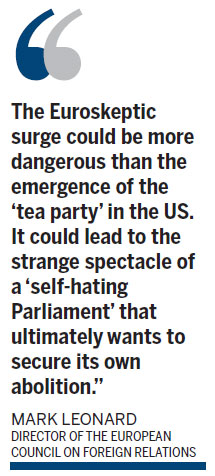Skeptics set to fight EU from inside after voting
By Agence France-Presse in Brussels (China Daily) Updated: 2014-05-12 07:23Far-right parties in line to pick up seats in UK, France, Netherlands
Two weeks ahead of European Parliament elections, polls are predicting a Euroskeptic surge, packing the assembly with members set to fight the EU from within for the next five years.
Current surveys show anti-EU parties picking up anywhere from 100 to 200 seats in the 751-member Parliament when the continent's 400 million voters go to the polls from May 22 to 25.
Skeptics and far-right parties are set for major gains in heavyweight European Union nations such as Britain and France, as well as in the Netherlands.
In Germany, the AfD party, which aims to abolish the euro, is polling well, while Beppe Grillo's populists in Italy and the radical left Syriza in Greece are election front-runners.
"The Euroskeptic surge could be more dangerous than the emergence of the 'tea party' in the US," said Mark Leonard of the European Council on Foreign Relations. "It could lead to the strange spectacle of a 'self-hating Parliament' that ultimately wants to secure its own abolition."
The latest forecasts tip Nigel Farage's UK Independence Party to pick up a third of Britain's 73 EU seats and Marine Le Pen's National Front to grab a sizeable portion of France's 74.
Anti-EU parties are also likely to do well in the Czech Republic, Denmark, Austria, Lithuania, Hungary and Finland.
EU in crisis

Abstention, meanwhile, is forecast to hit a fresh record, even though turnout was already at a disappointing low of 43 percent in the last 2009 parliamentary vote.
Paradoxically, low interest in this eighth election in the history of the Parliament comes as both the assembly and the executive European Commission that runs daily affairs in Brussels win ever-increasing power over national governments.
But little over a year after enthusiastically picking up its Nobel Peace prize, and as Ukrainians defy mighty Russia with their bid to join the EU, the 28-nation bloc is caught in the worst economic and political crisis of its 60-year history.
With unemployment on the rise, hitting more than half of young people in some countries, the divide has grown between wealthy northern nations and southern have-nots as populists point a finger of blame at immigration and the euro.
The election "may just be the beginning of an ongoing voter rebellion in the heart of EU decision-making," said Martijn Lampart of the Dutch MotivAction research institute.
The far-right and Euroskeptic parties are divided, however, with Britain's Farage, Finland's far-right Finns and the Danish People's Party refusing to put together a parliamentary group with Le Pen on the grounds that the party remains racially prejudiced and anti-Semitic.
Le Pen rejects any such charge and plans to launch an anti-EU group with Geert Wilders, controversial leader of the anti-immigrant, anti-Islam PVV Dutch Freedom Party, which would open up the possibility of up to 3 million euros ($4.2 million) in yearly EU subsidies.
But the French rightist on no account will do business with Hungary's Jobbik or Greece's neo-Nazi Golden Dawn.
"There will be a collection, a rainbow of different kinds of Euroskeptics in the next Parliament. Will it be enough to form a blocking minority? I don't know. I doubt it," Farage told AFP.
"But it will certainly be a livelier, more interesting European Parliament," he added.










